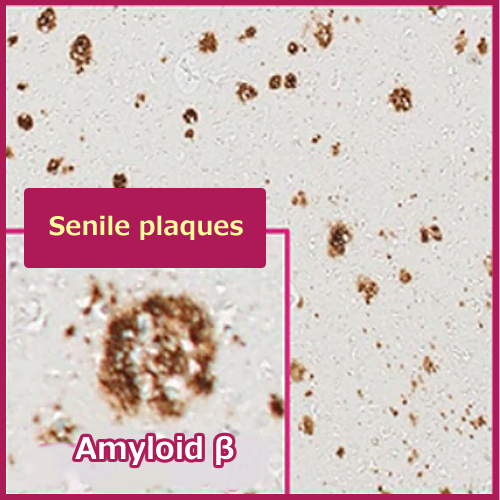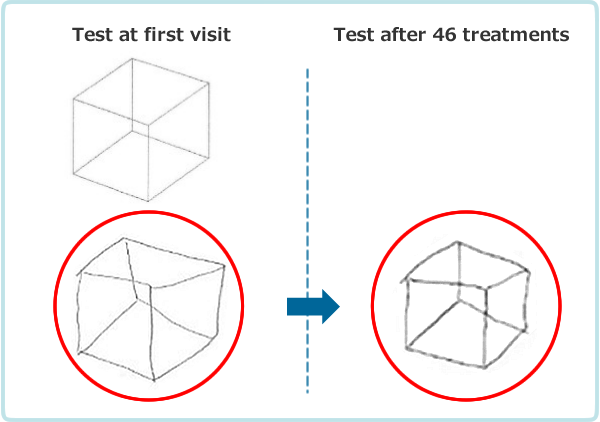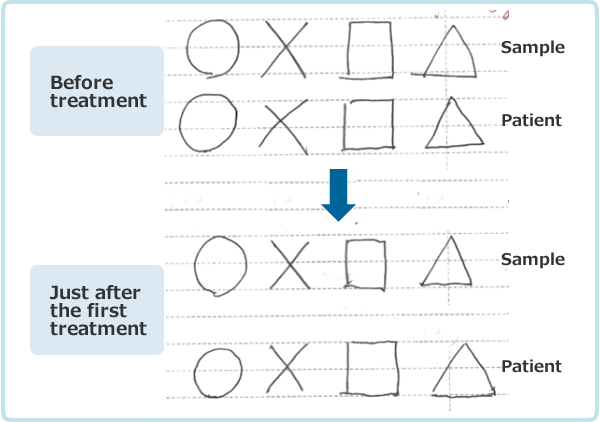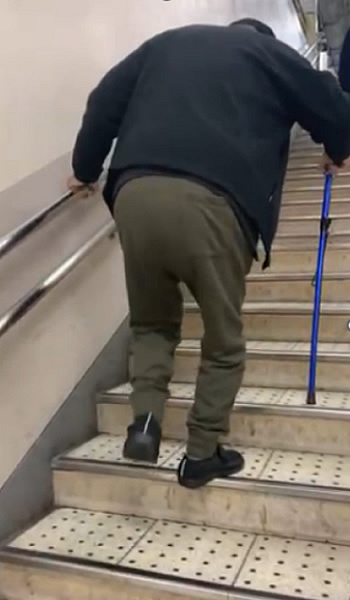Medical Treatment
Dementia
Dementia is the greatest challenge facing our aging society. The Ministry of Health, Labor and Welfare estimates that 7 million people will develop dementia in Japan in the future. Therefore, its prevention and treatment are extremely important. New meridian therapy has been treating people with dementia at the request of their families. As a result, we have found that it is possible to improve this condition through early treatment. The following are actual cases.
What is dementia?
Dementia is a condition in which mental functions and abilities such as intelligence, memory, comprehension, language, action, disorientation, emotion, motivation, personality, and character acquired during development are impaired by organic lesions in the brain, making it impossible to lead an independent daily life, social life, professional life, and smooth human relations.
Because conventional medicine often fails to correct organic lesions, dementia is non-reversible and non-remediable.
In the following, we will discuss Alzheimer's disease, which accounts for 50% of all dementias.
Alzheimer's disease
The onset of Alzheimer's disease in early old age is from the late 40s to early 60s, and in old age, from the late 60s onward. Memory impairment, dysmotivation, judgment disorder, aphasia, apraxia, agnosia, personality disorder, mirror phenomenon, and Kluver-Bucy syndrome appear, and the symptoms gradually progress to advanced dementia. In addition, neurological symptoms such as epileptic seizures and muscle stiffening are added, and finally, the patient shows apallial syndrome, a degenerative brain disease that makes the patient bedridden.
Pathological changes in the brain include senile plaques (deposition of amyloid-β protein), Alzheimer's neurofibrillary tangles, and neuronal loss, resulting in brain atrophy.

The lesions begin in the medial temporal lobe (hippocampus and parahippocampal gyrus) and the temporal-parietal-occipital junction.
The pathophysiology is significant for abnormal cleavage of amyloid protein precursors, abnormal and premature deposition of Aβ, and neuronal damage caused by Aβ (amyloid hypothesis) and phosphorylated tau protein accumulation in neurons. In addition, abnormal decreases in neurotransmitters such as acetylcholine (acetylcholine hypothesis) underlie the disease.
In the hereditary form, familial Alzheimer's disease is present, with genetic abnormalities in chromosomes 14, 19, and 21.
Heredity is also indicated by evidence of point mutations in amino acid sequences in the amyloid protein precursor.
Other factors include oxidative stress, inflammatory mechanisms, and microcirculatory abnormalities. The pathogenesis of the disease is unknown. However, based on our research and clinical experience, we believe that refined sugar dependence and sugar overload are important factors in Alzheimer's disease.
Treatment: Acetylcholine-degrading enzyme inhibitors (donepezil) and neuronal protectants (memantine) are used. They temporarily slow the progression of dementia, but do not improve the dementia itself.
Non-pharmacologic therapies (exercise, reminiscence, music therapy, animal therapy, recreation therapy, etc.), lifestyle guidance, and day care may be helpful. (From Nanzando Medical Dictionary)
The theory that Alzheimer's disease is diabetes of the brain.
Alzheimer's disease (hereafter referred to as Alz) is a growing disease worldwide, especially in Asia. The Asian association is thought to be related to the rice diet. Alzheimer's accounts for 50% of dementia, 30% cerebrovascular, 12% Alz plus cerebrovascular complications, the rest Lewy body dementia, etc.
Until the 1950s, Alz was considered a rare disease in Japan, although it was occasionally seen in Western countries.
In Japan, 6.2 million people suffer from Alzheimer's disease in 2012, including both dementia and pre-dementia, or 1 in 7 people over 65 years old and 1 in 4 people over 85 years old. By 2025, it is estimated that 6.75-7.3 million people will have Alzheimer's disease.
In the U.S., there are currently 5.3 million people with Alz, and this number is estimated to triple by 2050.
Diabetes is the leading cause of Alzheimer's disease
Insulin is responsible for getting blood sugar into cells. When diabetes is caused by lack of exercise and overeating of carbohydrates, and high insulin levels persist, the number of insulin receptors responsible for getting glucose into the cells decreases and the efficiency of insulin action is reduced. This is called insulin resistance. As resistance is acquired, more and more insulin is secreted, eventually leading to pancreatic exhaustion and insulin deficiency.
Insulin acts in the brain to support neuronal survival, repair, create memory, and break down amyloid beta protein. Insulin resistance reduces insulin action in the brain, leading to the accumulation of Aβ. Aβstimulates the brain's microglia (glial cells that support neurons) and increases inflammatory cytokine secretion, which further aggravates insulin signaling, a vicious cycle that leads to progressive Alz.
This is thought to be how diabetes causes Alzheimer's disease. The Rotterdam Study, a well-known study of the relationship between diabetes and Alz, found that "diabetes doubles the risk of developing Alz. Also in Japan, a study conducted since 1961 by the 2nd Dept. of Internal Medicine at Kyushu Univ. reported that diabetic patients, including those with pre-diabetes, have twice the risk of developing Alz as non-diabetic patients. Therefore, it is essential to prevent Alz by restricting carbohydrates and exercising to prevent diabetes.
Example of new meridian treatment for dementia
Since 2009, we have been treating 1) developmental disorders, and since 2012, 2) higher brain dysfunction (traumatic dementia) due to MTBI, and have improved 80-90% of developmental disorders and 50%-80% of higher brain dysfunction due to MTBI.
New meridian therapy is effective in activating cranial nerve cells and increasing cerebral blood flow, which has improved developmental disorders and MTBI higher brain dysfunction.
The difference between Alz dementia and developmental disorders and MTBI is that the latter are mostly caused by higher brain dysfunction due to brain trauma, except for Asperger's syndrome due to temperament transmission, which is caused by damage to the cortex and axonal nerves due to trauma. Therefore, its treatment focuses on repair of cortical and axonal fibers. For the repair of cranial nerves, activation of cranial nerve cells and improvement of cerebral blood flow through new meridian therapy are effective.
As mentioned in the description of new meridian therapy, the hand and foot acupoints have the effect of activating the glucose metabolism of cranial nerves and improving cerebral blood flow. This promotes cranial nerve repair/regeneration. This is the rationale for the effectiveness of new meridian therapy for dementia. In developmental disorders in children caused by brain injury, we have treated more than 730 cases so far, and the effectiveness of this treatment has been proven.
And MTBI has treated more than 300 cases (more than 50 cases in traffic accident cases), which overlap with developmental disorders caused by head injury, and its effectiveness has been recognized with improvement of higher brain dysfunction.
Alz dementia is known as "diabetes of the brain" and is associated with excessive intake of carbohydrates and refined sugar. Diabetes is caused by two major factors: excessive sugar intake and lack of exercise. The major difference between the causes of Alz and developmental disorders is that Alz is based on a lifestyle-related disease of excessive sugar intake and lack of exercise.
Therefore, to prevent and treat Alz dementia.
1) Activation of brain cells and improvement of cerebral blood flow through new meridian therapy.
2) Improvement of diabetes through carbohydrate restriction.
3) Improvement of diabetes by improving basal metabolism through exercise.
4) Stimulation of the hippocampus through walking and communication.
The treatment is a combination of the above.
As dementia progresses, it becomes difficult to treat. Therefore, 1) prevention is the most important, and 2) is important to start treatment as early as possible at the stage when mild forgetfulness begins.
This will prevent and improve dementia.
Treatment Case 1
77 years old female
Disease name: Dementia
- Occupational History
- From 40 to 70 years old, sales staff
- Dietary preferences
- She likes bread and udon noodles, and also eats eggs, meat, tofu.
Breakfast: bread, lunch: noodles - History of present illness
- She has been concerned about forgetfulness for one year. When she goes out, she returns three times to pick up forgotten items. Lives alone. Wakes up once a night to go to the bathroom.
- Treatment
- New meridian therapy and carbohydrate restriction.
- Progress
-
- After 2 treatments (hereafter referred to as Tx)
- Sleep is good. Nighttime peeing has decreased. She has been eating Pacific saury (mackerel), pig in a pot, hijiki (elk), and namulu (fish).
- 4 Tx
- Her forgetfulness decreased.
- 22 Tx
- Her forgetfulness decreased. Animal name-recall test: 12 pieces.
- 25 Tx
- Acquaintances say she looks like a sister to her daughter.
- 45 Tx
- Sleep is good. Her forgetfulness is improving. She can recall the place where she put things quickly. She reads books for 2 to 3 minutes. Heard on NHK that coloring books are good, so she is going to try it. She has more motivation.
- 51 Tx
- She forgets things only once a day. Recently, she started to check her forgotten things.
Before, she used to forget something 2-3 times and go home to get it. - 55 Tx
- She met her friends and they said she looked younger.
- 66 Tx
- She can remember where she put things. End of treatment.
Figure 7-2 compares the results of the cube copying test during the initial visit and after 46 new meridian therapies. After therapy, the vertical lines have improved.
Figure 7-2. Progress of stereoscopic imitation test: After 46 treatments, three dimensional was better.
Treatment Case 2
82-year-old female
Disease name: dementia (Lewy bodies), Heberden's node
- History of present illness
-
Her husband passed away 8 years ago and she has been living alone since then.
2-year ago, she started having forgetfulness and was diagnosed with dementia and prescribed medication (donepezil). 2 months later, she was switched to memantine, which she has been taking. Mood is calmer, but memory is deteriorating. She visits our clinic with her daughter to discuss treatment options other than medication. The daughter reports that she sometimes forgets to meet someone.
Hasegawa Simplified Intelligence Assessment 24/30
- Taste
- likes sweets: eats buns, pastries, cupcakes, cookies, etc. daily.
Started eating sweet things after getting a job at age 18.
18-24 years old worked in office, sales, and part-time job.
50-54 years old worked part-time at a confectionery shop and got into the habit of taking home and eating sweets (Japanese cake and manju). For the past 60 years,
she eats snacks at home every day. Eats 1/3 bag of rice crackers, etc. a day. Excessive intake of refined sugar due to sweets is a problem. - Family member's story
- She has dementia and somehow manages to live alone now, but lately she has become quite forgetful. She often forgets to take her medication.
- Progress of treatment
- Immediately after the first treatment, she was able to draw figures and write neatly, confirming the effectiveness of the new meridian treatment.

Figure 7-3: Comparison of lines of figures drawn before and after the first new meridian treatment.
After treatment, the lines of the figure are better aligned and balanced.- After first Tx
- She refrains from eating sweets. She thought the two physiotherapy doctors were identical, but found out they were two different people.
- 2 Tx
- She chats. Motivation has increased. Laughs more. She does not eat sweets. She is getting better as if she is peeling off her skin. She knows that she has to take the elevator to the 2nd floor for treatment.
- 4 Tx
- She refrains from eating sweets. She is reading a book.
- 5 Tx
- She does her own laundry. She is cutting back on sweets.
- 6 Tx
- She meets up with her daughter in the city and it goes well. Before treatment, she had forgotten to meet up with her daughter.
- 8 Tx
- She cooks her own meals at lunch and dinner. She cooked a horse mackerel to boil.
- 10 Tx
- Her conversation becomes smooth. However, she is forgetful, so the doctor instructs her to write notes on paper.
- 13 Tx
- She forgets some things. She remembers recent events. Remembering the flower of a mountain ash. She remembers new things.
- 14 Tx
- Hasegawa Assessment 25/30
Table 7-1. Vegetables known At initial visit (5/9/2022) After treatment (7/4/2022) Radish Carrot Cabbage Radish Lettuce Potato Onion Carrot Onions Asparagus Potatoes Cabbage Cucumbers Mizuna Taro Cucumbers Burdock Tomato Harankyo Table 7-2. Delayed replay memory (test for recall of three words said earlier that are recalled later) Initial visit (5/9/2022) After treatment (7/4/2022) Cherry blossoms Cherry blossoms Cat Cat Vehicle?(Incorrect) Train Table 7-3. Immediate replay memory (memory replay test of 5 presented items such as watch, pencil, note, etc.) At initial visit (5/9/2022) After treatment (7/4/2022) 2 points 3 points She states “They come into my mind, but they don't come out in words.” - 17 Tx
- Progress is good. She remembers by herself and takes her medicine.
- 20 Tx
- She got used to eating less sweets. She can go shopping.
- 21 Tx
- Her speech has become more firm. She knows the shortest way to the supermarket. She can remember and talk even if she stops talking.
- 22 Tx
- She begins to cook again.
- 23 Tx
- She can tell the day of the week. For the first time, she can tell the day of the week.
- 24 Tx
- After a meal in a restaurant, she usually pays the bill in big notes because she can't calculate fractions, but now she pays fractions in coins. Everyone was surprised.
- 25 Tx
- At the day service, her daughter, who last autumn used to prepare things for her to take with her, now she prepares them herself.
- 26 Tx
- She started cooking one month ago, although she had not been cooking for 3-4 months since she developed dementia.
- 28 Tx
- She cooked komatsuna, mushrooms, okra fried and boiled vegetables by herself.
- 33 Tx
- She is cooking. Drying the futon. Writing her name in romaji.
- 34 Tx
- She cooks foods mixed with a beaten egg. Ongoing treatment.
- Summary
- With the new meridian therapy and carbohydrate restriction, the patient's daily activities have improved markedly. It is expected that the improvement in dementia will be maintained with regular treatment.
Treatment Case 3
89 years old male
Disease name: Dementia
- History of present illness
-
Before his hospitalization for the new corona, he was in need of nursing care I. He was able to walk, take a bath, and eat by himself.
Three months ago, he contracted pneumonia due to the new corona, and was hospitalized for seven weeks. His arterial blood oxygen saturation dropped to 90%. During his hospitalization, he was bedridden for two weeks, and after rehabilitation, he was able to climb the stairs and return home. There is no elevator on the 7th or 8th floor of his home, so he has to walk up the stairs. After being hospitalized, his dementia progressed rapidly and he became a nursing care V patient. Even now, he has difficulty walking alone and needs an escort. He cannot take a bath by herself. He can eat by herself. He can talk. He does recognize his family. He has forgotten that his friend was died.
This is a case in which severe dementia was improved by intensive daily treatment with the new meridian therapy.
- Progress
-
- First Tx
- He tried to take a bath by himself.
- 3 Tx
- When his family left his clothes/pants out, he was able to put them on by himself. Almost stopped urinating in his diaper during the night and started going to the toilet to do it.
- 5 Tx
- He was able to walk to the store about 500m from his house by himself.
- 8 Tx
- He was able to wash himself in the bathtub. He was able to walk about 1.5 km with a walker.

Figure 7-4. After 8 Tx, he was able to walk 1.5 km using a walker. - 10 Tx
- He was able to sit still and on the ground for a long time. He was able to walk by himself to the park, a two-minute walk from his house.
- 12 Tx
- He was able to stand up and walk around the house by himself.
- 13 Tx
- He began to share sweets with his family. He started to read the newspaper, although he had not read it at all for a while.
- 17 Tx
- He was able to walk with a cane from his home to a store about 200m away.
- 19 Tx
- He was able to walk with a cane about 1.6km from his home.

Figure 7-5. He was able to walk with a cane about 1.6km from his home. - 20 Tx
- He was able to change into his pajamas by himself.
- 26 Tx
- He was able to read the newspaper on his own.
- 32 Tx
- He was able to fold his pajamas by himself.
- 34 Tx
- He was able to warn his grandchildren who were doing wrong on his own.
- 44 Tx
- He changed his clothes by himself when instructed to do so. He was able to walk with a cane by himself from his home to the station 350 meters away and back in one hour. 46 Tx
- 46 Tx
- He was no longer in a wheelchair when he got into the car to be picked up from the day service, and could sit in the car by himself.
- 55 Tx
- A day service worker was surprised that he had recently started to walk well.
- 61 Tx
- He was laughing cheerfully as he called his daughter, who was far away. The family was surprised that he was able to make a normal phone call.
- 85 Tx
- He was walking up the stairs faster.

Figure 7-6. He was able to climb stairs faster. - Summary
- Thus, even severe dementia can be improved by intensive new meridian therapy. To maintain this, regular treatment should be continued.
Conclusion
Alzheimer's disease, which constitutes the core of dementia, is diabetes of the brain and can be improved by early treatment with exercise, carbohydrate restriction and new meridian therapy.